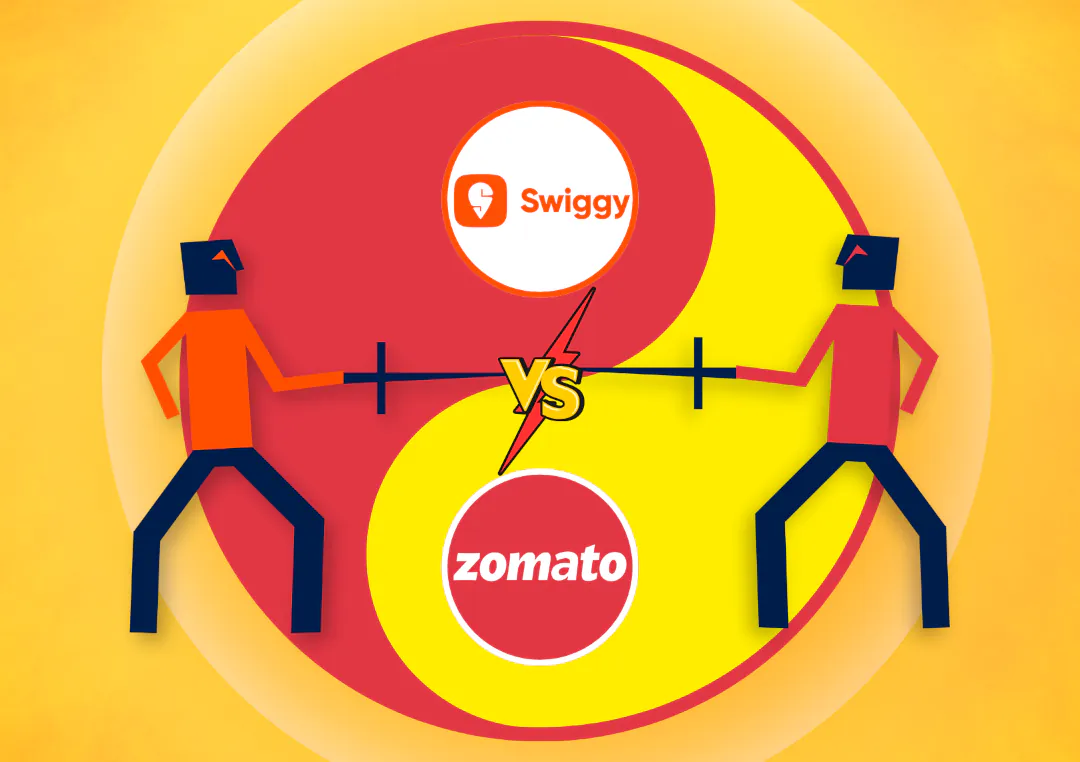Introduction
In a landmark case, India’s Competition Commission (CCI) recently investigated food delivery giants Zomato and Swiggy for anti-competitive practices. This case brought the Zomato Swiggy Competition Act Case into the spotlight, particularly around concerns regarding their business models and the impact on the food delivery market. Let’s break it down and learn how the Competition Act, 2002, plays a crucial role in regulating businesses and protecting consumers.
The Zomato Swiggy Competition Act Case: What Happened?
In 2024, the CCI found that Zomato and Swiggy may have violated certain provisions of the Competition Act by using their dominant position in the market to push smaller restaurants into unfair contracts. The investigation focused on allegations that these platforms were engaging in practices that could harm competition, such as charging higher commissions from restaurants, showing unfair preference to certain restaurant partners, and using data from their platform to give an unfair advantage to their own restaurant partners (through Zomato’s “Zomato Kitchen” or Swiggy’s “Swiggy Instamart”).
Understanding the Legal Provisions of the Competition Act Involved
Section 3(4): Anti-competitive Agreements and the Zomato Swiggy Case
The Competition Act prohibits any agreements that restrict or distort competition in India. This includes cartel-like behavior, price-fixing, and other unfair trade practices between companies. In this case, the CCI investigated whether Zomato and Swiggy had entered into agreements with restaurants that were unfair or anti-competitive.
Section 4: Abuse of Dominant Position by Zomato and Swiggy
Both Zomato and Swiggy are major players in the food delivery industry. The Competition Act prohibits abuse of dominant market positions that harm competition. The CCI looked into whether these companies were misusing their dominant positions to extract higher commissions or manipulate pricing, potentially violating the Competition act regulations.
Why the Zomato Swiggy Competition Act Case Matters to You (Consumers)
Fairer Pricing and Choices Under the Competition Act
If companies engage in anti-competitive behavior, it can lead to higher prices for consumers. By regulating businesses like Zomato and Swiggy under the Competition Act, the CCI ensures that food delivery platforms cannot exploit restaurants or consumers, leading to fairer pricing.
Encouraging Innovation Through Competition Act Enforcement
A competitive market forces companies to innovate and improve services. By preventing dominant companies like Zomato and Swiggy from stifling competition, the Competition Act encourages new businesses to enter the market and improve customer experiences.
Protection Against Unfair Practices: The Role of the Competition Act
As a consumer, you’re protected from unfair business practices that could harm your choices and pocket. For instance, if one platform forces all restaurants to join at higher commission rates, you could end up paying more for food delivery due to a lack of Competition act adherence.
Key Takeaways: Zomato, Swiggy and the Competition Act
- The Competition Act ensures that dominant companies in any sector, including food delivery (like Zomato and Swiggy), don’t harm consumers by charging unfair prices or restricting market competition.
- The CCI plays a vital role in investigating these companies and ensuring that businesses follow the rules outlined in the Zomato Swiggy Competition act.
- The investigation of Zomato and Swiggy shows how the law steps in to protect smaller businesses and consumers from unfair practices within the context of the Competition Act.
Conclusion: The Significance of the Competition Act in the Zomato Swiggy Case
The Zomato and Swiggy case is a perfect example of how the Competition Act, 2002, is used to regulate businesses, protect consumers, and maintain fairness in the marketplace. For young consumers, it’s important to be aware of these laws and understand how they can impact everyday services you use. If the CCI finds these platforms guilty, it will not only affect the companies’ business models but will also help create a fairer and more transparent market for everyone involved, upholding the principles of the Competition Act.
So thats it for today students. LectureKart will be with you again shortly. Till then stay tuned and share this article with your fellow students. Cheers.
-

Environmental Social and Governance (ESG) Principles and Practice Masterclass by CS Aditi Pant for CS Professional
Rated 4.67 out of 5Sale!₹9,999.00Original price was: ₹9,999.00.₹5,499.00Current price is: ₹5,499.00. -

The CORPORATE SOCIAL RESPONSIBILITY (CSR) & GOVERNANCE Masterclass by CS Aditi Pant – Handwritten Notes + Reference Index + FREE Online Classes
Rated 4.63 out of 5Sale! ₹3,499.00 – ₹3,699.00Price range: ₹3,499.00 through ₹3,699.00 This product has multiple variants. The options may be chosen on the product page -

The Intellectual Property Rights Masterclass by CS Aditi Pant – Handwritten Notes + Reference Index (FREE Online Classes Included)
Rated 4.50 out of 5Sale! ₹3,999.00 – ₹4,299.00Price range: ₹3,999.00 through ₹4,299.00 This product has multiple variants. The options may be chosen on the product page

















1 thought on “Zomato Swiggy Competition Act: Understanding the CCI Investigation and Its Impact”
This was really useful and I understood a lot